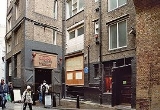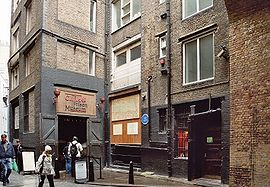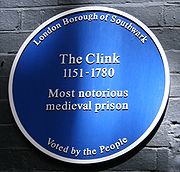
The Clink
Encyclopedia

Prison
A prison is a place in which people are physically confined and, usually, deprived of a range of personal freedoms. Imprisonment or incarceration is a legal penalty that may be imposed by the state for the commission of a crime...
in Southwark
Southwark
Southwark is a district of south London, England, and the administrative headquarters of the London Borough of Southwark. Situated east of Charing Cross, it forms one of the oldest parts of London and fronts the River Thames to the north...
, England which functioned from the 12th century until 1780 either deriving its name from, or bestowing it on, the local manor, the Clink Liberty
Liberty (division)
Originating in the Middle Ages, a liberty was traditionally defined as an area in which regalian rights were revoked and where land was held by a mesne lord...
(see also the Liberty of the Clink
Liberty of the Clink
The Liberty of the Clink was an area in Southwark, on the south bank of the River Thames, opposite the City of London. Although situated in Surrey the liberty was exempt from the jurisdiction of the county's high sheriff and was under the jurisdiction of the Bishop of Winchester who was usually...
). The manor and prison were owned by the Bishop of Winchester
Bishop of Winchester
The Bishop of Winchester is the head of the Church of England diocese of Winchester, with his cathedra at Winchester Cathedral in Hampshire.The bishop is one of five Church of England bishops to be among the Lords Spiritual regardless of their length of service. His diocese is one of the oldest and...
and situated next to his residence at Winchester Palace
Winchester Palace
Winchester Palace was a twelfth century palace, London residence of the Bishops of Winchester. It is located south of the River Thames in Southwark, near the medieval priory which today has become Southwark Cathedral.-History:...
. The Clink was possibly the oldest men's prison and probably the oldest women's prison in England.
The origins of the name "The Clink" are uncertain, but it is possibly onomatopoeic and derives from the sound of striking metal as the prison's doors were bolted, or the rattling of the chains the prisoners wore.
The name has come into use in British slang as a generic term for prison or a jail cell.
History

The building of a chapel and mansion at Southwark was begun in 1107 by the then current Bishop of Winchester, but was not completed until 1144, by his successor. There were two prisons included, one for men and one for women. It would have been a good source of income for the Bishop, as it was about this time that the brothels were regulated, bringing in plenty of fines and customers. The brothels were closed, reopened, moved and used throughout the life of the Clink, bringing in prisoners at a fairly steady rate. By 1180 the land was owned outright by the Clink prison.
The prisoners were ill treated although those with money and friends on the outside were able to pay the gaolers to make their time better. As the gaolers were very poorly paid, they found other ways to supplement their income. They hired out rooms, beds, bedding, candles and fuel to those who could afford it. Food and drink were charged at twice the correct price. They accepted payments for fitting lighter irons and for removing them completely. For a fee, prisoners would be allowed outside to beg or even to work. Madams were allowed to keep a brothel going, with payments going to the gaolers. Poorer prisoners had to beg at the grates that led up to street level and sell anything they had with them, including their clothes to pay for food.
In 1450 rioters protesting the Statute of Labourers raided Winchester House. Classing clerics as tax collectors, they murdered them, and released prisoners from the Clink before burning it down. The rebellion was put down and Winchester House was rebuilt and extended, including a new prison.
Decline
In 1649 Winchester House was sold to a property developer and was divided into shops, tenements and dye houses. The Cage was removed temporarily as ratepayers had complained about the cost of upkeep, but the whipping post was still busy. By 1707 both of these and the stocks were all unused because of the cost of upkeep, and by 1732 there were only two registered inmates. In 1745 a temporary prison was used as the Clink was too decayed to use, although by 1776 the prison was again taking in debtors. It was burnt down in 1780 by Gordon riotorsGordon Riots
The Gordon Riots of 1780 were an anti-Catholic protest against the Papists Act 1778.The Popery Act 1698 had imposed a number of penalties and disabilities on Roman Catholics in England; the 1778 act eliminated some of these. An initial peaceful protest led on to widespread rioting and looting and...
, and was never rebuilt.
Today
The Clink Prison Museum is currently located on the original site in Clink Street, in the basement of a former warehouse. The museum tries to recreate the conditions of the original prison.English Catholics
- Father John Gerard, S.J.John Gerard, S.J.John Gerard, S.J. was an English Jesuit priest, operating covertly in England during the Elizabethan period in which the Catholic Church was subject to persecution. He was the son of Sir Thomas Gerard of Bryn, near Ashton in Makerfield, Lancashire, who had been imprisoned in 1569 for plotting the...
~1595 - Father Thomas Strange, S.J.
- Father George BlackwellGeorge BlackwellFather George Blackwell was Roman Catholic Archpriest of England from 1597 to 1608.-Biography:Blackwell was born in Middlesex, England about 1545, perhaps the son of the pewterer Thomas Blackwell. He was admitted as a scholar to Trinity College, Oxford on 27 May 1562...
~1607-1613 - Matthew Wilson, alias Edward Knott, Jesuit author. 1629-1633
English Protestants
- John Lothropp
- Anne AskewAnne AskewAnne Askew was an English poet and Protestant who was condemned as a heretic...

